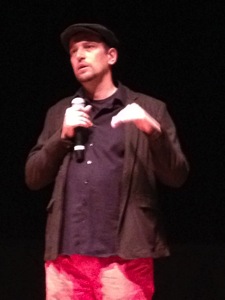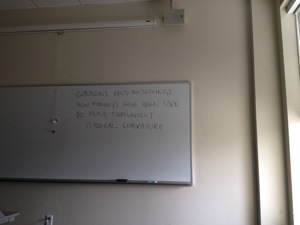
Another full day. It began with Stefan Kiesbye giving a seminar looking at blurred boundaries between fiction and CNF. I was reminded of James Tadd Adcox saying that, to him, CNF was just fiction where the protagonist had the author’s name. Kiesbye looked a number of works, talking about the controversy around the publication of Robert Coover’s The Public Burning, fake movie reviews which allow the piece to comment upon its own narrative, something otherwise only possible in a post-modern omniscient POV. We also looked at Stefan’s fake travelogue, “Vanishing Point”. He views it as an exercise in language, how we decide what’s real and what’s not. “It’s not about truth, it’s about sounding true.” He noted that when he first subscribed to The New Yorker he would start reading from the back (where the movie reviews are), and then page forward to the front. He would read pages not knowing what they belonged to but the fiction was always instantly recognizable as such (I noticed this myself while reading Jennifer Percy’s Demon Camp which I started knowing nothing more than the title, and immediately realized it was narrative non-fiction and not a novel purely by the tone of the prose). There’s something especially apropos in this since I’m currently working on a short piece which does this sort of thing.

After workshop and lunch, we had the first round of student seminars. I attended an excellent pair of seminars from Bradley Woodrum and Gregg WIlhelm. I’m really looking forward to what’s to come.
The final seminar of the day was Alan Michael Parker with “A book is a thing.” He focused on structuring collections of stories or poems. He defined something as literary if it caused the reader to read forward through the text but backwards through the subtext, that is reading a story will cause the reader to reinterpret the stories that came before.
Leave a Reply